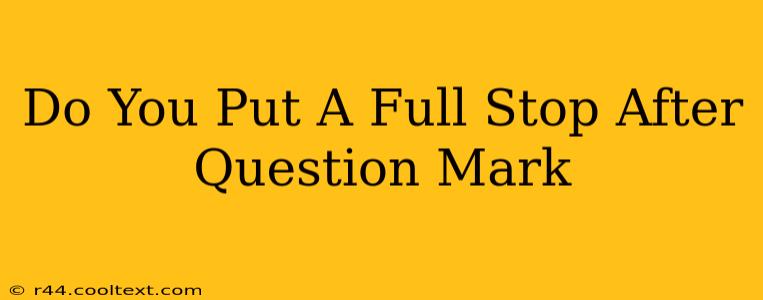Do You Put a Full Stop After a Question Mark?
The short answer is: no. You do not put a full stop (period) after a question mark. A question mark (?) already signifies the end of a sentence that is asking a question. Adding a full stop would be grammatically incorrect and redundant.
Think of it this way: punctuation marks have specific jobs. The question mark's job is to signal that a question is being asked. The full stop's job is to signal the end of a declarative sentence (a statement). Using both together is like having two people try to do the same job at the same time – it's unnecessary and confusing.
Understanding Sentence Structure and Punctuation
Correct punctuation is crucial for clear communication. It ensures your writing is easily understood and avoids ambiguity. Let's look at some examples:
- Correct: "What time is the meeting?"
- Incorrect: "What time is the meeting?".
The incorrect example includes both a question mark and a full stop, making it unnecessarily cluttered and grammatically flawed.
Exceptions and Special Cases
While the general rule is straightforward, there are some nuanced situations to consider:
-
Multiple Sentences: If a question is part of a longer sentence containing multiple clauses, the punctuation will depend on the structure of the whole sentence. For instance:
- "Do you know where the library is, and could you direct me there?" (One question, one question mark)
- "I'm not sure if it's open today; did you check their website?" (Two separate sentences/questions, two question marks).
-
Indirect Questions: Indirect questions are questions that are not directly asked. These are often embedded within a statement and don't require a question mark:
- Direct Question: "What is your name?"
- Indirect Question: "I would like to know what your name is." (No question mark needed).
Mastering Punctuation for Clear Communication
Proper punctuation isn't just about following rules; it's about ensuring your writing is clear, concise, and effectively conveys your intended meaning. By mastering the nuances of punctuation, including the correct use of question marks and full stops, you can significantly improve the quality and readability of your writing. This leads to better communication and leaves a more professional impression on your readers. So, remember – one question mark per question is all you need!

